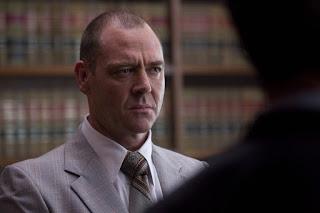
It seems the perfect time for a fresh fictionalization of Watergate. Peter Landesman's Mark Felt: The Man Who Brought Down the White House (2017) was in development long before 2016, yet its parallels with contemporary political scandals are unavoidable. Liam Neeson is quite good as the irascible FBI official who helped topple Richard Nixon. But it's somewhat sluggish and confused, at best, about its message.
Mark Felt (Liam Neeson) is the longtime number two man to J. Edgar Hoover at the FBI, handling counterterrorism and collecting dirt on Hoover's political enemies. When Hoover dies, he's chagrined to find that President Nixon appoints an outsider, L. Patrick Gray (Marton Csokas) as Director. He's more chagrined when a burglary at Democratic National Headquarters in Washington is connected to the White House, who immediately pressures Gray and Felt to shut down the investigation. But Felt is an old pro and connives to keep the investigation alive, whether leaking information to friendly reporters (becoming nicknamed "Deep Throat") or stonewalling Nixon's stonewalling.
Since Mark Felt draws from the G-Man's own memoirs, it's unsurprising that the movie offers little criticism of him. It's mentioned in passing that he turns on Nixon after being passed over for promotion, but we're encouraged to see this as secondary to his desire for truth and justice. A good egg, this Mark Felt; in his introduction he meets with Nixon's goons, chiding John Dean (Michael C. Hall) about the rights of antiwar protesters and refusing a request to provide dirt on the President's enemies. How could such a paragon have anything but noble motives?

Landesman also shows Felt's unsavory actions, from warrantless wiretaps to illegal burglaries against the Weathermen and like groups that led to his indictment years later. But the movie queers its own message in endorsing this behavior. In a speech out of Dirty Harry, Felt bemoans the legal restrictions against the Bureau as a hindrance to police work. He also asserts, in a speech with chilling implications, that the FBI shouldn't be accountable to anyone. A generous viewer might assume this is an effort at complexity, yet there's little doubt the movie expects us to accept Felt's words as gospel.
This, indeed, is Mark Felt's central problem. Presumably we're meant to draw parallels between Nixon and the current president, who fired his own FBI Director early in his term and regularly rants about a "Deep State" conspiracy to expose his crimes. Yet it's difficult to see the Bureau fresh from Hoover's domineering rule in a positive light; there's even a winking scene where Felt hides Hoover's "confidential" blackmail files from Pat Gray, with the assertion it's better that the G-Men hide or destroy them than that a president might gain them. The movie doesn't really stop to ask whether the mere existence of such files is a bad thing.
The movie proves even more brazen in passing the buck onto Bill Sullivan (Tom Sizemore), Hoover's disgruntled deputy, for Hoover's worst actions. Sullivan was indeed responsible for myriad abuses, from writing the Martin Luther King suicide letter to serving as point man for Nixon's Huston Plan. But the implication that the FBI itself was beyond reproach, save for this bad apple, is grotesque; even Clint Eastwood's J. Edgar didn't go that far. And the depiction of Pat Gray, in reality a bumbling yes-man in over his head, as a Machiavellian puppet master snarling threats from the shadows borders on laughable.
 Landesman's script is workmanlike, alternating gobs of exposition with cliched epigrams ("that's the cost of doing this job"); his direction isn't any more inspired, with a washed-out blue gray pallet that's murky and oppressive. Felt's "humanized" with a nagging wife (Diane Lane) and runaway hippie daughter (Maika Monroe) in scenes as tedious as they are predictable. The scenes where Neeson briefs a Time reporter (Bruce Greenwood) and Bob Woodward (Julian Simmons) can't help paling next to All the President's Men's equivalent sequences. The movie ends on a clunky note where Felt's tried for his crimes, only for the movie to end with a juror demanding to know if Felt was Deep Throat. Why the cliffhanger when we know the answer?
Landesman's script is workmanlike, alternating gobs of exposition with cliched epigrams ("that's the cost of doing this job"); his direction isn't any more inspired, with a washed-out blue gray pallet that's murky and oppressive. Felt's "humanized" with a nagging wife (Diane Lane) and runaway hippie daughter (Maika Monroe) in scenes as tedious as they are predictable. The scenes where Neeson briefs a Time reporter (Bruce Greenwood) and Bob Woodward (Julian Simmons) can't help paling next to All the President's Men's equivalent sequences. The movie ends on a clunky note where Felt's tried for his crimes, only for the movie to end with a juror demanding to know if Felt was Deep Throat. Why the cliffhanger when we know the answer?Liam Neeson gives a fierce, focused performance that occasionally transcends the shoddy script. He invests Felt with enough energy and toughness that we see the contours of a more complex, conflicted character that a smarter film would have provided. The supporting cast, packed with big actors in small roles, is a complete waste. Diane Lane's character feels like the residue of a bigger part; Bruce Greenwood, Tom Sizemore and Noah Wyle have maybe five minutes of screen time between them. Michael C. Hall is a dead ringer for John Dean but only has a few scenes to exchange veiled threats with Felt. Marton Csokas is appropriately creepy as Gray, who serves as the primary villain since Nixon's never directly portrayed.
I enjoyed Landesman's Concussion (2015) more than most; it wasn't a masterpiece, but it was a good try at a relevant film about a challenging subject. But Mark Felt is merely a compendium of cliches and bad ideas, occasionally ballasted by its cast. There are all already many better Watergate movies out there; watch one of them instead.

